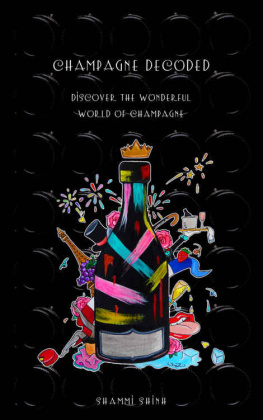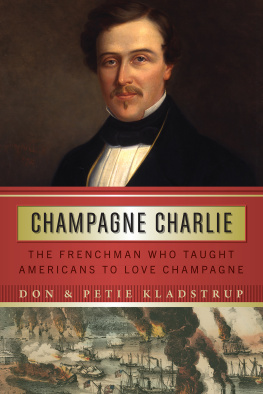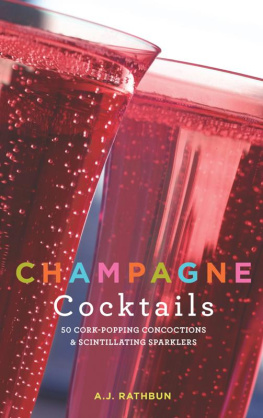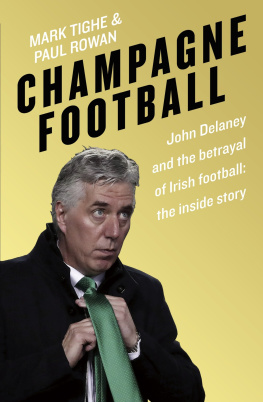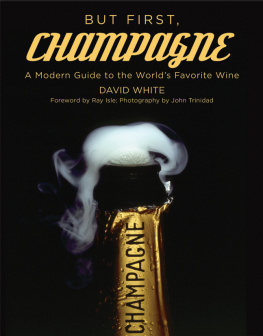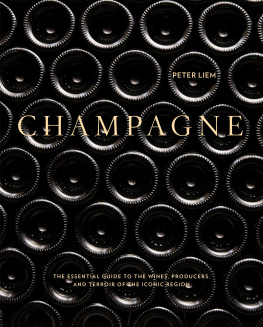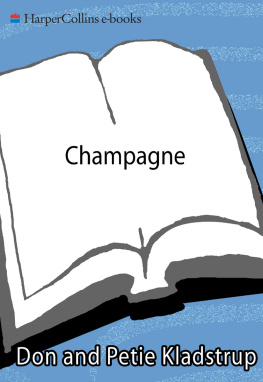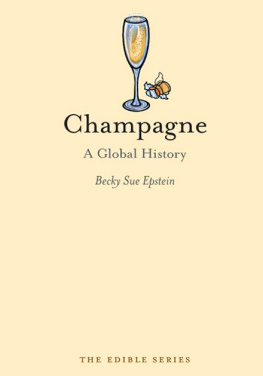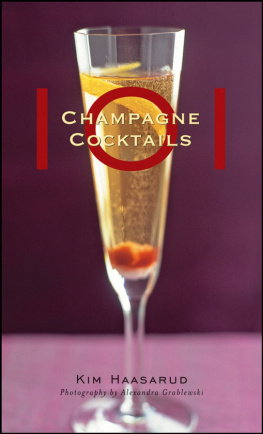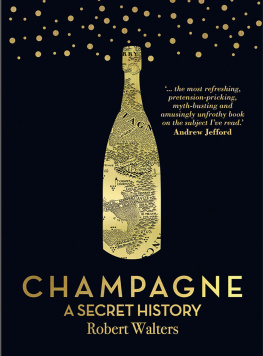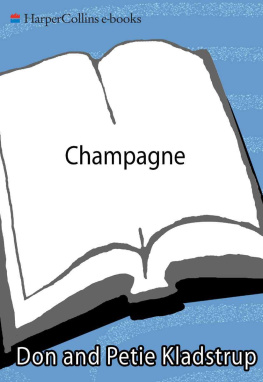Shinh - Champagne Decoded
Here you can read online Shinh - Champagne Decoded full text of the book (entire story) in english for free. Download pdf and epub, get meaning, cover and reviews about this ebook. year: 2015, publisher: Decoded Books, genre: Home and family. Description of the work, (preface) as well as reviews are available. Best literature library LitArk.com created for fans of good reading and offers a wide selection of genres:
Romance novel
Science fiction
Adventure
Detective
Science
History
Home and family
Prose
Art
Politics
Computer
Non-fiction
Religion
Business
Children
Humor
Choose a favorite category and find really read worthwhile books. Enjoy immersion in the world of imagination, feel the emotions of the characters or learn something new for yourself, make an fascinating discovery.
- Book:Champagne Decoded
- Author:
- Publisher:Decoded Books
- Genre:
- Year:2015
- Rating:3 / 5
- Favourites:Add to favourites
- Your mark:
- 60
- 1
- 2
- 3
- 4
- 5
Champagne Decoded: summary, description and annotation
We offer to read an annotation, description, summary or preface (depends on what the author of the book "Champagne Decoded" wrote himself). If you haven't found the necessary information about the book — write in the comments, we will try to find it.
Champagne Decoded — read online for free the complete book (whole text) full work
Below is the text of the book, divided by pages. System saving the place of the last page read, allows you to conveniently read the book "Champagne Decoded" online for free, without having to search again every time where you left off. Put a bookmark, and you can go to the page where you finished reading at any time.
Font size:
Interval:
Bookmark:
Champagne Decoded
By Shammi Shinh
Copyright Prodiguer Brands
Index
Introduction
Circa 2004 I began my journey into the Champagne world. Over ten years of experience, education and knowledge from production to marketing to the lifestyle it comes with. My aim was to make a mark in the industry I wanted to pursue, which I did, gracefully.
Only a few of us know Champagne comes from Champagne, only a few of us know Champagne begins its life as wine. Allow this simple, yet illustrative guide Champagne Decoded to educate you in all things Champagne.

School of Champagne
Every enthusiast about anything must know the basics of their passion.
Champagne is a sparkling wine that comes from a region in France named Champagne. If it originates from anywhere else it cannot legally be called Champagne. Therefore, sparkling wine from Italy is called Prosecco and sparkling wine from Spain is Cava. A common misconception is that Champagne is not a brand but the product itself with different variations. However, it is a variation of sparkling wine itself.
There are variations of how champagne began in various print and digital articles. In the very early stages of its invention it is quite well known that during the second fermentation of champagne production bottles would simply explode and cause a domino effect in cellars causing almost a whole harvest worth of bottles to explode, the reason behind this was that the bottles simply were not strong enough to hold the pressure. The search began for stronger bottles and this led the early champagne producers, across the ocean to Newcastle, UK. There, they used coal instead of charcoal for heating the furnaces, resulting in stronger glass due to the higher combustion temperatures. So the United Kingdom played a big role in getting the champagne industry stabilised, until the French were able to produce stronger bottles themselves.
It is useful to know things that matter to your consumption of champagne, such as what variations of champagne there are, i.e. Brut, Ros, Blanc de Blancs, the differences between them, sweet or dry champagnes, what classifies as vintage, the different bottle sizes available and the temperature for chilling and serving.

Glossary
The process of creating Champagne is extensive and detailed and requires a separate glossary. It is useful knowing the different terms and for every enthusiast it is a must to know and understand the process.
Assemblage
Assemblage is what makes champagne so different from other wines. It is the process of combining many still wines from a variation of grapes, of different years and villages and blending them precisely. It goes without saying; this is a highly skilled task to do correctly. Experienced Oenologists are able to meticulously create some of the finest blends.
Base Wine
Before the Assemblage takes place a base wine is chosen to act as a starting component.
Btonnage
Using a wooden stick, the still wine is stirred after the first fermentation so the dead yeast sediment is not sitting idle, this will in turn affect the balance and aroma of the wine. Not all champagne producers do this.
Champagne
Legally, Champagne can only be called Champagne if it is produced and originates from the Champagne region. Most regions around the world have their own name for sparking wines. The UK and USA simply have Sparking Wine. Cava is the Spanish version, Prosecco the Italian and Sekt the German.
Chef de Cave
This means cellar master, the person that leads the team of wine makers within a champagne house. The Chef de Cave is typically a highly skilled and experienced individual that does not only understand wine, but also the science behind it.
Clos
Clos is a term that refers to prestigious vineyards that have a walled enclosure to improve the climate and prevent theft.
Corked
The general conception for the term corked, leads on to believe a wine has bits of cork in the wine, this is not always the case. There are in fact different levels of corked; these can range from simply undrinkable to offensive. A tainted cork can affect a wines aroma and flavour leaving it flawed and of course corked.
Crown Cap
Used on beer bottles all around the world, not many know that crown caps are also used in the production of champagne. During the second fermentation and ageing a crown cap is used to seal champagne bottles. Once the bottles are ready they go through a process called Disgorgement where the cap is then replaced with a cork.
Cru
Cru is a word used to determine the quality ranking amongst vineyards belonging to different Champagne Villages. There are very few villages that rank in at 100%. These villages are known as Grand Cru. Next in order are Premier Cru villages, these villages rank at 90-99%. The remainder of villages that fall below 90% are given the rank of just Cru.
Cuve
The term cuve is mainly known for being a specific blend of wine, however it does hold a second reference. The term cuve is also given to the first pressing juice. The first juice usually represents the highest quality juice from the pressing process.
Dbourbage
After the pressing process, sediment needs to be removed. The juice must be clear before fermentation begins.
Disgorgement, Dgorgement
This is the process champagne bottles go through before being sold. After fermentation and ageing, the yeast sediments need to be removed from the bottle. Through riddling by hand or a gyropalette the sediment is collected at the neck of the bottle. The neck is placed in freezing liquid (several bottles at the same time) this forms an ice cube trapping the sediment. The crown cap is then removed and the ice ejected. Very few houses still riddle and disgorge by hand. Machinery has now made the process not only quicker but also more precise. There is no evidence supporting that doing these processes by hand is better. It may sound good on a brands marketing but the truth is the machines do it better.
Dosage
After disgorgement some wine is lost and is topped up by a dosage. This dosage gives the producer a chance to alter the champagnes flavour by adding sugar in a solution form. The original sugar in the champagne is lost during fermentation so a sweetener is required. The dosage doesn't only make the champagne sweeter but adjusts acidity as well. The exact level of dosage determines the category of champagne (Brut, Demi-Sec etc) Between 0-15 grams is Brut.
Fermentation
During champagne production there are two fermentation stages. The first usually takes place in tanks or barrels to create a still wine. The second fermentation takes place in the bottle. During the second fermentation the yeast interacts with the sugar thus creating alcohol and carbon dioxide bubbles.
Grower Champagne
When an estate produces and bottles their own champagne this is typically known as growers champagne. Globally, an increasing number of restaurants and bars are advertising themselves as only serving grower champagnes. A grower champagne is not superior to other producers but they have their own distinct way of production.
Liqueur de Tirage
This is the solution added at bottling that promotes the second fermentation. Some refer to it as the third fermentation. The solution consists of wine, sugar and yeast.
Mthode Champenoise
This is the term given to the traditional method of making champagne. The EU has protected this term and is only applicable to champagne.
Next pageFont size:
Interval:
Bookmark:
Similar books «Champagne Decoded»
Look at similar books to Champagne Decoded. We have selected literature similar in name and meaning in the hope of providing readers with more options to find new, interesting, not yet read works.
Discussion, reviews of the book Champagne Decoded and just readers' own opinions. Leave your comments, write what you think about the work, its meaning or the main characters. Specify what exactly you liked and what you didn't like, and why you think so.

